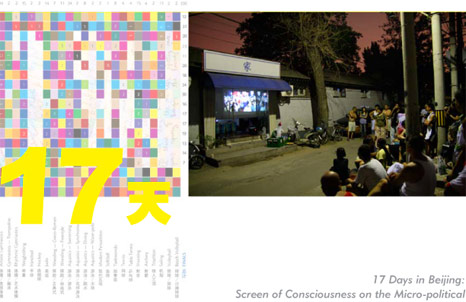
photo above right by Jeroen de Kloet, HomeShop Games 2008 closing ceremonies.
The following text was written September 2008 by Sean Smith and Elaine W. Ho as a proposal for Public Journal issue 40:
——–
Two of the most prominent features of contemporary Olympic spectacles were both introduced at the Berlin Summer Games of 1936: the invention of the torch relay as an exhortation toward a strong German fatherland, and the introduction of live television viewing areas around Berlin, which leveraged some of the most innovative media technologies of the day to help entwine the sporting events with the National Socialist party’s quest for power. And though such media coverage has transformed dramatically from its humble beginnings in 1936 Berlin to the audiovisual feast on display at this year’s 2008 Summer Olympics in Beijing, the basic premise of public viewing areas and the underlying desire to streamline a burgeoning nationalism have remained largely the same. However, China’s unique blend of communist politics and increasingly market-based economics provides a highly complex backdrop to the context of Beijing’s urban sporting screens. The 2008 Olympic spectacle, already amplified by the intense glare of instantaneous global television distribution and its own partisan torch relay, witnessed ubiquitous LED countdown boards throughout Beijing climax into city-wide viewing monitors aboard most public transport vehicles and two dozen Olympic cultural squares featuring large-screen public viewing areas sponsored by some of the world’s largest transnationals.
Following Paolo Virno, we might suggest that these attempts to leverage the sporting popular into urban spaces via the public viewing screen are intended to consolidate and homogenize the people into the One of the State (or at least the One of the Target Market). It is through this lens that we have viewed the Olympic Games this year, both as spectators and critical observers, and from this temporarily fixed vantage point of questioning and observation, we embarked upon a project called HomeShop series number one: Games 2008.
As a series of “minor practices” and interventions in the middle of one of Beijing’s old hutong alleyways, the HomeShop project used a store space turned sleeping-working-living space and its window front as the beginning point from which to examine our ways of relaying between public and private, the commercial and pure exchange as such. The spatio-temporal framework of Beijing and the Olympic Games was revisioned as a grid from which indeterminacies could appear, converge and reappear anew——a way of fostering intersecting spaces between the urban environment and everyday practices. In contrast to the nation-wide public displays of arousal during the countdown to 08.08.08, each day of the Olympics marked a countdown to the end of the project, with the passage of time marked by daily activities at varying scales of community engagement, from field recordings to a clothing collection, group readings of texts on mapping spatial practices to stoop-front discussions with locals.
The project reached peaks with larger events centered around the screen, the membrane between public and private. The HomeShop countdown began and ended with storefront viewing parties of the opening and closing ceremonies, and a party held in honor of the “losers” featured Wii videogame Olympic events projected on screen and played live in the street. Each of the activities of the project aimed at offering, within the daily routes of local residents, a minor-scale potentiality for our ways of engaging with the community and public space.
We would like to propose as a submission for the upcoming issue of PUBLIC a presentation of the HomeShop Games 2008 project, whereby its screen is set against the intoxicating brew of government policy, corporate sponsorship and global sporting nationalism, and less-tangible questions of play, permeability and mapping. Essay, images and a dialogue between the authors will introduce a theoretical train of thought that attempts to locate HomeShop and its screen within contemporary critical aesthetics and politics.

 时间 posted on: 18 September 2008 |
时间 posted on: 18 September 2008 |  发布者 author:
发布者 author: 
 分类 filed under:
分类 filed under: